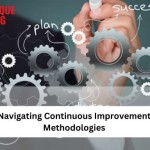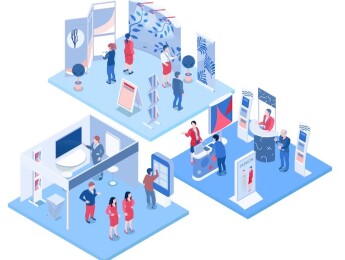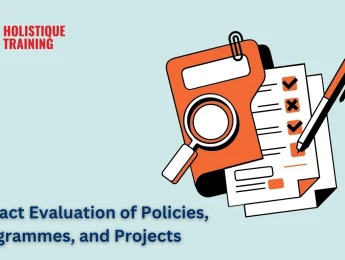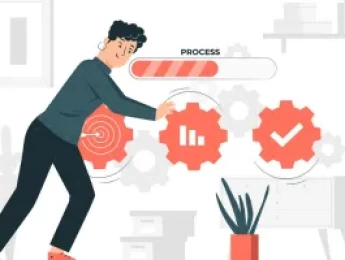It’s too easy to remain in the safe zone with your business. You know what works and what doesn’t; sometimes, taking a risk is difficult, even if you think it may pay off.
However, if you remain static, your processes and systems will become outdated, which may mean you fall behind the competition. It’s essential that you use innovative ideas and up-to-date process models to improve your organisation’s procedures continuously.
Continuous improvement means that you will meet the demands of your clients and customers and will be seen as a more viable option for stakeholder investment.
Being proactive about your goals and using clear communication will help you gain buy-in from your workforce, lower attrition, and keep your customer base interested in your next big step to increase your profit margins. Continuous improvement means understanding the bigger picture and excelling in risk management to mitigate service failures, move towards streamlining processes, and generate more profit while maintaining excellent service.
Upon completion of this course, participants will be able to:
- Become familiar with project planning and recognise where change is required.
- Assess potential risks and learn to mitigate them to achieve positive results.
- Identify new and trending customer demands and build a framework to exceed expectations.
- Understand the role of leadership when developing continuous improvement strategies.
- Develop your key performance indicators and long-term business goals around continuous improvement processes.
- Understand Six Sigma and Lean development models to aid continuous improvement practices.
- Communicate the reasons and requirements for continuous improvement to customers and employees to ensure smooth development.
- Accurately record and monitor the result of improvement processes to determine the best way forward.
This course was created for people who are responsible for making process changes or leading projects to improve business performance and drive profits. It would be particularly beneficial for:
- Project Planners
- Finance Managers
- HR Personnel
- Directors
- Business Owners
- Operations Managers
- Change & Control Managers
- Planning Managers
- Data Analysts
- Team Leaders
This course uses a range of adult learning methods, including trainer-led seminars to discuss the current marketing and financial climate, practical journey mapping exercises to determine the areas that require innovation and real-life case studies encased in discussion groups to help put the theory into a practical situation.
You will discover planning methods to streamline your processes and develop effective communication styles through role-playing to ensure you gain customer and employee buy-in. This course uses a range of adult learning methods, including trainer-led seminars to discuss the current marketing and financial climate, practical journey mapping exercises to determine the areas that require innovation and real-life case studies encased in discussion groups to help put the theory into a practical situation.
You will discover planning methods to streamline your processes and develop effective communication styles through role-playing to ensure you gain customer and employee buy-in.
Day 5 of each course is reserved for a Q&A session, which may occur off-site. For 10-day courses, this also applies to day 10
Section 1: Why Innovation Is Important
- Understanding the principles of innovation.
- Why the status quo is bad for business.
- Understanding the need for change.
- The power of brainstorming issues.
Section 2: Being Creative And Confident With New Ideas
- How to pilot a project effectively.
- Thinking outside the box.
- Identifying areas in need of change.
- Research into competitors - staying ahead of the game.
- Customer journey mapping.
Section 3: Developing A New Business Direction
- The role of leadership in continuous improvement.
- Radical vs. incremental change.
- Prioritisation matrix.
- The 80/20 methodology.
- Problem-solving and strategic thinking.
Section 4: Identifying And Mitigating Risk
- Six Sigma.
- LEAN ways to eliminate waste.
- SWOT analysis of change.
- Identifying key areas of concern.
- Lateral thinking to mitigate risk.
Section 5: Communication Is Key
- Communicating change to your workforce.
- How to communicate changes to your customers.
- Gradual rebranding or website changes to accommodate customer needs.
- Motivating a team and gaining buy-in.
- Effective negotiation and persuasion techniques.
- Communicating failures positively.
Section 6: Monitoring And Reporting Techniques
- Analysing the stats. What’s working and what isn’t?
- Evaluating and documenting results.
- Qualitative vs. quantitative data.
- Gathering useful feedback.
- Using social media and website analytics to determine success.
Section 7: Understanding Change Processes
- Reworking failures to create successes.
- Lessons learned sessions to promote continuous improvement.
- Could further review create broader changes?
- Creating a plan for the future.
Upon successful completion of this training course, delegates will be awarded a Holistique Training Certificate of Completion. For those who attend and complete the online training course, a Holistique Training e-Certificate will be provided.
Holistique Training Certificates are accredited by the British Assessment Council (BAC) and The CPD Certification Service (CPD), and are certified under ISO 9001, ISO 21001, and ISO 29993 standards.
CPD credits for this course are granted by our Certificates and will be reflected on the Holistique Training Certificate of Completion. In accordance with the standards of The CPD Certification Service, one CPD credit is awarded per hour of course attendance. A maximum of 50 CPD credits can be claimed for any single course we currently offer.
Categories
Management & Leadership,- Course Code MG2-112
- Course Format Classroom, Online,
- Duration 5 days














